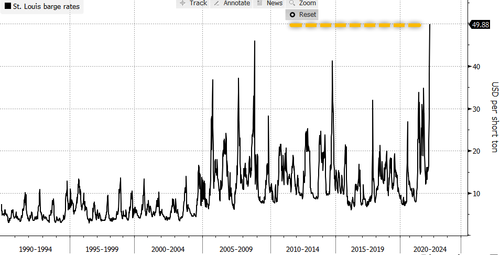“Dangerously Low” Mississippi River Level May Spark Transport Chaos For Farm Goods During Harvest
A drought is drying up parts of the Mississippi River, a major export channel for corn and soybeans. Barges cannot haul farm goods at full capacity because of shrinking water levels, sparking a vessel shortage that has sent transport prices to record highs. It’s another headache for the American farmer this harvest season.
Bloomberg reported the crucial US water artery for the Midwest economy is experiencing critically low levels at some points due to the lack of rain. Lower water levels mean barges reduce cargo loads to improve draft, so it takes more vessels to haul farm goods which have caused a vessel shortage on the waterway.
Barge rates this past week jumped to$49.88 per ton, the highest on record and up 50% from a year ago.
The waterway is responsible for at least half of the US corn and soybean exports. The shrinking water level, barge shortage, and skyrocketing shipping costs are terrible for farmers during harvest season.
While barge scarcity and rate spikes could be “detrimental” to growers, “I’m not sure there’s much we can do about it,” Matt Ziegler, public policy manager at the National Corn Growers Association, said.
“The tight barge supply is problematic for grain shippers heading into harvest,” the US Department of Agriculture wrote in a weekly ag report. It said soaring demand for barges during harvest time “will likely put even more upward pressure on barge rates.”
Dryness this year in much of the Mississippi river basin is leading to low water levels in many locations and raising risk of interrupted barge traffic. https://t.co/D08vCWVPSr pic.twitter.com/pvFrjvzIdv
— Commodity Wx Group (@commoditywx) September 29, 2022
Water levels on the Lower Mississippi River are dangerously low in some areas and may slow or even stop barge traffic just as corn and soybean #harvest starts. Read more in Cash Market Moves from @MaryCKenn here: https://t.co/tZiPJCtcNB
— DTN/Progressive Farmer (@dtnpf) September 28, 2022
Another supply chain issue and soaring transport costs will only add to food inflation. There’s no word (yet) if shipment disruptions exist because this could exacerbate the global food crisis. The world has been closely observing the North American growing season to restock food reserves after Russia invaded Ukraine, disrupting international trade flows.
Tyler Durden
Sat, 10/01/2022 – 14:00
via ZeroHedge News https://ift.tt/fLODCEy Tyler Durden
